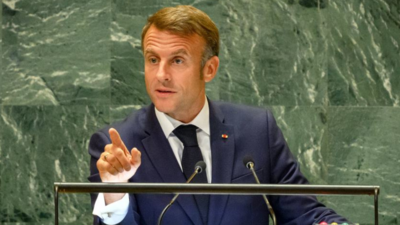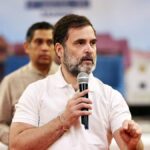
New Delhi: A big push for India’s security efforts permanent seat United Nations Security Council (UNSC) President Emmanuel Macron The French president said on Thursday he fully supports expanding the agency to make it more inclusive and representative of the changing world order.
Speaking at the UN General Assembly, Macron said: “France supports the expansion of the Security Council. GermanyJapan, India and Brazil should become permanent members, and Africa will also designate two countries as permanent members.
But he warned that the reform alone would not be enough to restore the council’s effectiveness and called for changes to the body’s working methods, limiting veto powers in cases of mass crime and focusing more on operational decisions needed to maintain peace.
“Now is the time to regain efficiency for better action on the ground,” he concluded.
The diplomatic push comes amid recent challenges faced by the United Nations in resolving global crises, such as the war in Ukraine and the standoffs in conflicts such as Gaza. These circumstances have led to calls for reform of the UN Security Council to increase its effectiveness and credibility. Jaishankar noted that as perceptions of the United Nations’ growing weakness grow, India’s chances of gaining a permanent seat on the Security Council are growing.
India’s voice is getting louder
India’s bid for a permanent seat has gained momentum of late, especially after the Quad countries – the United States, India, Japan and Australia – issued a joint statement at their sixth summit.
The statement reaffirmed its support for reform of the United Nations Security Council and stressed the need to make it more inclusive and representative.
US President Joe Biden reiterated this support during bilateral talks with Indian Prime Minister Narendra Modi, highlighting India’s significant contribution to international peacekeeping operations and its status as the world’s largest democracy.
Additionally, US Secretary of State Antony Blinken reiterated US support for India’s bid at the recent UN General Assembly summit. He stressed that UN Security Council reform should include permanent seats for India, Japan and Germany, as well as representation for Africa and other regions.
Blinken’s comments underscore a broader recognition among major global players that India’s membership will enhance the legitimacy and functionality of the UN Security Council.
old order
Currently, only five countries are permanent members of the UN Security Council and hold veto power: the United States, China, France, Russia and the United Kingdom. In addition to the five permanent members, the United Nations Security Council also has ten non-permanent members, who are elected by the United Nations General Assembly for two-year terms.
With the exception of China, all permanent members support UN Security Council expansion in some way.
The existing structure has been criticized for being outdated and unrepresentative of current geopolitical realities, especially as the number of UN member states has grown from about 50 at its founding to 193 today.
Jaishankar: ‘The United Nations remains a prisoner of the past’
External Affairs Minister S Jaishankar, in his recent speech at the second G20 Foreign Ministers’ Meeting held on the sidelines of the 79th session of the United Nations General Assembly, said the United Nations is a prisoner of the past and must evolve with the world.
“The field of global governance reform… starts with the reform of the United Nations and its affiliated agencies. The world has developed into a smart, interconnected, multi-polar arena, and the number of its members has increased fourfold since the founding of the United Nations. However, the results of the United Nations, still are prisoners of the past. United Nations Security Council Its efforts to fulfill its mission of maintaining international peace and stability undermine its effectiveness and credibility.
Jaishankar said southern countries must be given a legitimate voice.
“Without reforms, including an expansion of the number of members of the United Nations Security Council in both categories, its lack of effectiveness will only persist. Expansion and appropriate representation of the permanent membership are particularly necessary. Asia, Africa and Latin America – the Global South cannot “There continues to be a shortage – they must be given a legitimate voice and real change needs to happen, and it needs to happen quickly,” he said.
!(function(f, b, e, v, n, t, s) { function loadFBEvents(isFBCampaignActive) { if (!isFBCampaignActive) { return; } (function(f, b, e, v, n, t, s) { if (f.fbq) return; n = f.fbq = function() { n.callMethod ? n.callMethod(...arguments) : n.queue.push(arguments); }; if (!f._fbq) f._fbq = n; n.push = n; n.loaded = !0; n.version = '2.0'; n.queue = (); t = b.createElement(e); t.async = !0; t.defer = !0; t.src = v; s = b.getElementsByTagName(e)(0); s.parentNode.insertBefore(t, s); })(f, b, e, 'https://connect.facebook.net/en_US/fbevents.js', n, t, s); fbq('init', '593671331875494'); fbq('track', 'PageView'); };
function loadGtagEvents(isGoogleCampaignActive) { if (!isGoogleCampaignActive) { return; } var id = document.getElementById('toi-plus-google-campaign'); if (id) { return; } (function(f, b, e, v, n, t, s) { t = b.createElement(e); t.async = !0; t.defer = !0; t.src = v; t.id = 'toi-plus-google-campaign'; s = b.getElementsByTagName(e)(0); s.parentNode.insertBefore(t, s); })(f, b, e, 'https://www.googletagmanager.com/gtag/js?id=AW-877820074', n, t, s); };
function loadSurvicateJs(allowedSurvicateSections = ()){ const section = window.location.pathname.split('/')(1) const isHomePageAllowed = window.location.pathname === '/' && allowedSurvicateSections.includes('homepage')
if(allowedSurvicateSections.includes(section) || isHomePageAllowed){ (function(w) {
function setAttributes() { var prime_user_status = window.isPrime ? 'paid' : 'free' ; w._sva.setVisitorTraits({ toi_user_subscription_status : prime_user_status }); }
if (w._sva && w._sva.setVisitorTraits) { setAttributes(); } else { w.addEventListener("SurvicateReady", setAttributes); }
var s = document.createElement('script'); s.src="https://survey.survicate.com/workspaces/0be6ae9845d14a7c8ff08a7a00bd9b21/web_surveys.js"; s.async = true; var e = document.getElementsByTagName('script')(0); e.parentNode.insertBefore(s, e); })(window); }
}
window.TimesApps = window.TimesApps || {}; var TimesApps = window.TimesApps; TimesApps.toiPlusEvents = function(config) { var isConfigAvailable = "toiplus_site_settings" in f && "isFBCampaignActive" in f.toiplus_site_settings && "isGoogleCampaignActive" in f.toiplus_site_settings; var isPrimeUser = window.isPrime; var isPrimeUserLayout = window.isPrimeUserLayout; if (isConfigAvailable && !isPrimeUser) { loadGtagEvents(f.toiplus_site_settings.isGoogleCampaignActive); loadFBEvents(f.toiplus_site_settings.isFBCampaignActive); loadSurvicateJs(f.toiplus_site_settings.allowedSurvicateSections); } else { var JarvisUrl="https://jarvis.indiatimes.com/v1/feeds/toi_plus/site_settings/643526e21443833f0c454615?db_env=published"; window.getFromClient(JarvisUrl, function(config){ if (config) { const allowedSectionSuricate = (isPrimeUserLayout) ? config?.allowedSurvicatePrimeSections : config?.allowedSurvicateSections loadGtagEvents(config?.isGoogleCampaignActive); loadFBEvents(config?.isFBCampaignActive); loadSurvicateJs(allowedSectionSuricate); } }) } }; })( window, document, 'script', );







